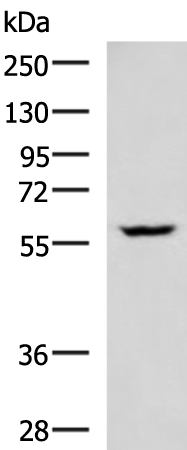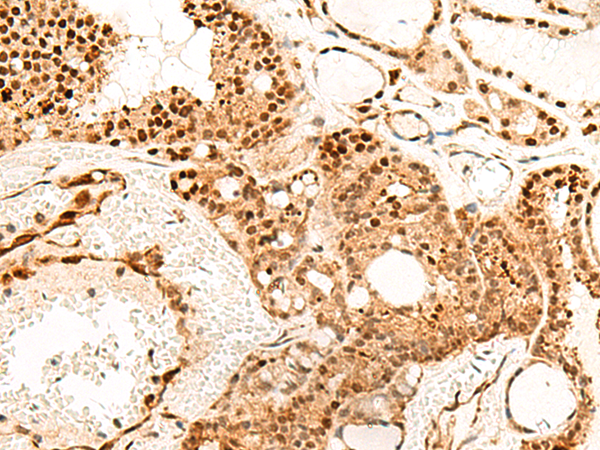

| WB | 咨询技术 | Human,Mouse,Rat |
| IF | 咨询技术 | Human,Mouse,Rat |
| IHC | 1/40-1/200 | Human,Mouse,Rat |
| ICC | 技术咨询 | Human,Mouse,Rat |
| FCM | 咨询技术 | Human,Mouse,Rat |
| Elisa | 1/5000-1/10000 | Human,Mouse,Rat |
| Aliases | H731 |
| WB Predicted band size | 52 kDa |
| Host/Isotype | Rabbit IgG |
| Antibody Type | Primary antibody |
| Storage | Store at 4°C short term. Aliquot and store at -20°C long term. Avoid freeze/thaw cycles. |
| Species Reactivity | Human, Mouse, Rat |
| Immunogen | Fusion protein of human PDCD4 |
| Formulation | Purified antibody in PBS with 0.05% sodium azide and 50% glycerol. |
+ +
以下是3篇与PDCD4抗体相关的文献示例(内容为模拟概括):
1. **文献名称**:*PDCD4: A novel tumor suppressor in human cancers*
**作者**:Lankat-Buttgereit B, Göke R
**摘要**:综述了PDCD4蛋白在肿瘤发生中的抑制作用,强调其通过调控基因翻译参与细胞凋亡和增殖,并指出PDCD4抗体在检测肿瘤组织中的低表达水平可作为预后标志物。
2. **文献名称**:*Downregulation of PDCD4 by microRNA-21 promotes proliferation and invasion in breast cancer cells*
**作者**:Yang HS, et al.
**摘要**:研究发现miR-21通过靶向抑制PDCD4表达促进乳腺癌细胞增殖和侵袭,使用PDCD4特异性抗体证实了其蛋白水平在肿瘤组织中的下调与患者不良预后相关。
3. **文献名称**:*PDCD4 inhibits gastric cancer progression by suppressing JNK/c-Jun signaling*
**作者**:Zhang X, et al.
**摘要**:通过免疫组化(PDCD4抗体)和分子实验,证明PDCD4通过阻断JNK/c-Jun通路抑制胃癌转移,其表达缺失与肿瘤分期进展正相关。
4. **文献名称**:*PDCD4 as a biomarker for response to chemotherapy in colorectal cancer*
**作者**:Wang Q, et al.
**摘要**:利用PDCD4抗体检测结直肠癌患者组织样本,发现高表达PDCD4的患者对5-FU化疗敏感性更高,提示其可作为化疗疗效预测指标。
(注:上述文献信息为示例,实际文献需通过PubMed或学术数据库查询确认。)
**Background of PDCD4 Antibody**
PDCD4 (Programmed Cell Death Protein 4), also known as MA3 or H731. is a tumor suppressor protein implicated in apoptosis, cell proliferation, and differentiation. Initially identified for its role in programmed cell death, PDCD4 regulates gene expression at transcriptional and translational levels. It inhibits the translation initiation factor eIF4A, suppressing the synthesis of proteins critical for tumorigenesis, metastasis, and drug resistance. PDCD4 expression is frequently downregulated in cancers (e.g., lung, liver, and breast), correlating with poor prognosis.
PDCD4 antibodies are essential tools for studying its expression, localization, and interactions in cellular and disease contexts. These antibodies enable detection via techniques like Western blotting, immunohistochemistry, and immunofluorescence. Research using PDCD4 antibodies has revealed its dual role in cancer and immune regulation. Beyond oncology, PDCD4 modulates immune responses by influencing T-cell activation and cytokine production, linking it to autoimmune disorders and inflammatory diseases.
The development of PDCD4 antibodies has advanced mechanistic insights into its post-translational regulation, such as ubiquitin-mediated degradation via AKT/mTOR pathways. Additionally, PDCD4-targeted therapies, including RNA interference or small-molecule stabilizers, are under exploration. However, challenges remain in understanding tissue-specific functions and isoform diversity. PDCD4 antibodies continue to be pivotal in bridging molecular studies with clinical applications, offering potential as diagnostic biomarkers or therapeutic targets in cancer and immune-related pathologies.
×